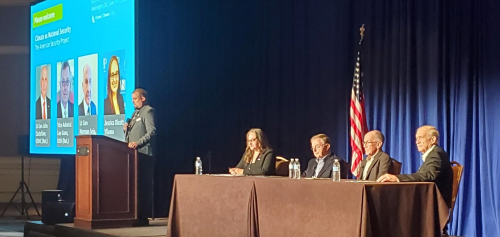
Event Recap—Climate As National Security: Considerations for the Climate Conversation
On Monday, June 12th, ASP presented an esteemed panel titled “Climate As National Security: Considerations for the Climate Conversation” at the Citizens’ Climate Lobby Conference in Washington, D.C. Jessica Olcott Yllemo, ASP’s Director of Climate Security Programs, gave an opening brief on the role of climate as a threat multiplier in military operations and moderated the panel discussion. Panelists included Lt Gen Norman Seip, USAF, (Ret.); ASP President, VADM Lee Gunn, USN (Ret.); and LtGen John Castellaw, USMC (Ret.).
Ms. Yllemo’s opening remarks covered the “wavetops” of the climate security discussion focusing on both how extreme weather events impact mission readiness and how climate change should be viewed as an accelerant of instability. She noted that the national security apparatus has recognized climate change as a challenge in both the National Security Strategy and the National Defense Strategy. Ms. Yllemo’s brief broke the challenges posed to the military by climate change into three key areas:
- Readiness: exemplified by an inability to train in high temperatures
- Operations: shown by increasing tensions in the Arctic
- Missions: displayed by the need for humanitarian aid in the U.S. and abroad after natural disasters.
Turning to the esteemed panel, VADM Lee Gunn gave an overview of how military training must now account for an ever-changing climate. VADM Gunn explained that when he was a young officer, climate was treated as static, but that assumption is no longer valid. Thus, we must adapt training strategies to account for climate change in order to best prepare current and future service members for future threats.
Lt Gen Seip highlighted the important role the Department of Defense can play in mitigating climate change by becoming an early adopter of evolving technologies. He specifically cited the need for the Air Force to reduce reliance on fossil fuels and move toward sustainable aviation fuels. All three of the panelists referred to former Secretary of Defense James Mattis’s quote that the military needs to be “unleashed from the tether of fuel” to reduce the number of American lives lost protecting fossil fuel sources and convoys during conflicts aboard. VADM Lee Gunn also discussed how small modular nuclear power generation can be safely used to reduce reliance on fossil fuels, exemplified by the Navy’s safety record with nuclear power generation in austere environments.
The panel spoke extensively on the impact of climate change, specifically sea level rise, to key military bases in the U.S. Lt Gen Seip explained the importance of rebuilding Tyndall Air Force Base after it was destroyed in 2018 because of its strategic location and the significance of coastal military bases for training and readiness across all the services. LtGen Castellaw also gave an example of climate change’s impacts on Naval Station Mayport, where the military and local government are working together to mitigate the impacts of sunny day flooding. The conversation also explored impacts to Norfolk Naval Base and Portsmouth Naval Shipyard, as well as the need to harden all military bases and operations to the threat posed by climate change. The panel concluded with a discussion on ways to move forward in the climate conversation with Lt Gen Seip stating “we’re at an inflection point, where the military can take the lead.”






